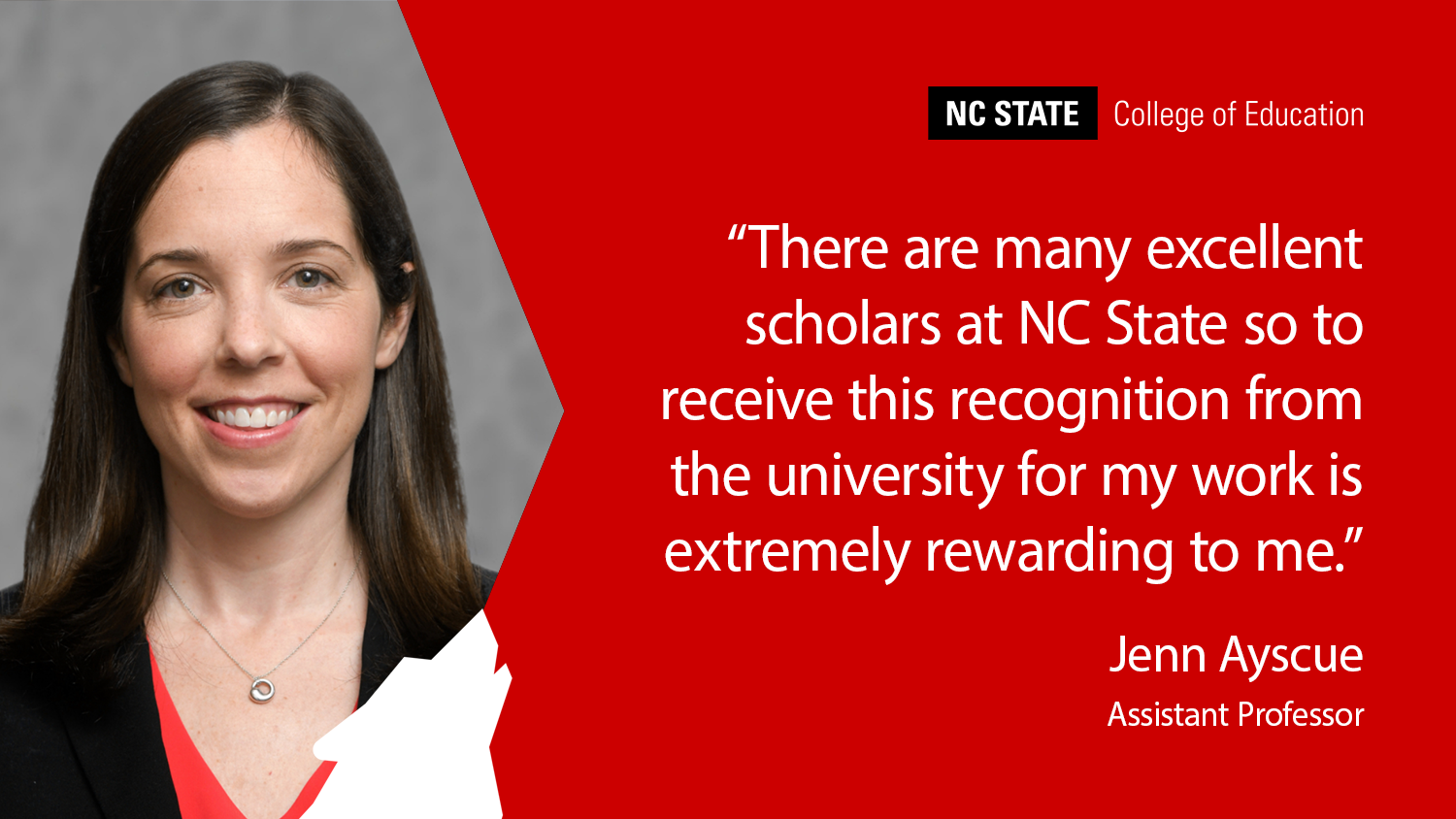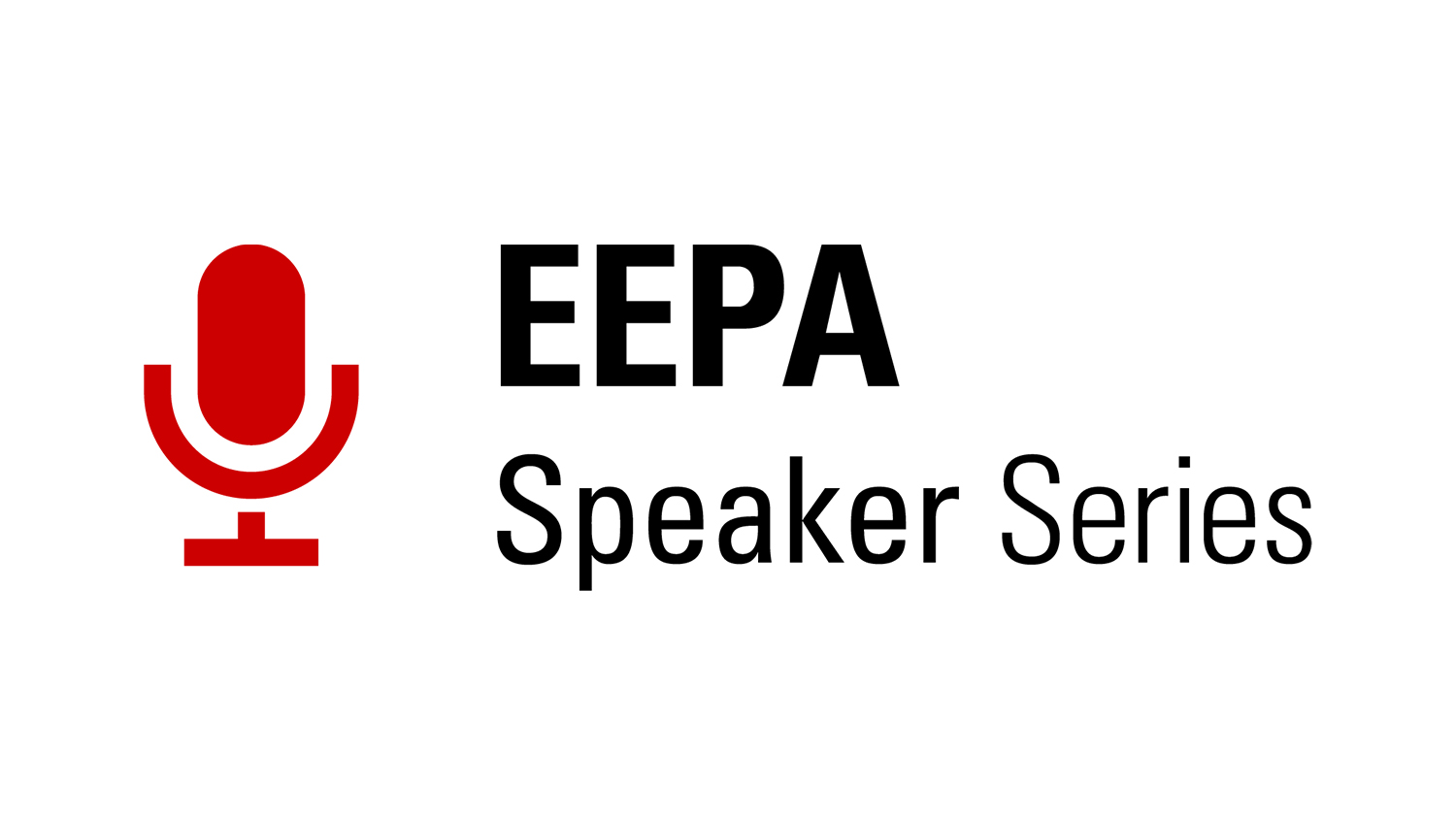Undertake research that addresses complex questions, reflects bold thought and results in educational policies that support effective schooling for all students.
The Ph.D. in Educational Leadership, Policy, and Human Development: Educational Evaluation and Policy Analysis (EEPA) concentration is a multidisciplinary field of study whereby students and faculty examine educational problems from different traditions, including economics, political science, sociology, history and organizational studies. Additionally, students are required to take coursework in advanced research methods which allows them to develop strong data analysis skills and conduct rigorous policy research that advances knowledge and practice.

Why Educational Evaluation and Policy Analysis at NC State:
Tailored concentration
Strong faculty
Rigorous training
Excellent location
Collegial environment
Commitment to DEI
My NC State Ph.D. was life changing. The coursework, mentoring and support provided me with the foundation, experiences and tools I would need for building and advancing my career as a faculty member, higher education administrator and state government executive. Even now as a college president, I continue to use skills gained as a doctoral student, and NC State faculty have continued to support me throughout my career.
– Wayne D. Lewis Jr., ’09PHD
Houghton College President and Former Kentucky Commissioner of Education
Concentration Details
CONCENTRATION DESCRIPTION
Concentration description: The Educational Evaluation and Policy Analysis concentration is one of five concentrations available in the Educational Leadership, Policy, and Human Development doctoral program. This concentration is a multidisciplinary program of study whereby students and faculty examine educational problems from different traditions, including economics, political science, sociology, history and organizational studies. Additionally, students are required to take coursework in advanced research methods which allows them to develop.
The Educational Evaluation and Policy Analysis concentration is designed to prepare dedicated, knowledgeable, skillful, ethically responsible, and socially and culturally aware professionals for the 21st century. It is one of five concentrations available in the Educational Leadership, Policy, and Human Development doctoral program. This concentration is a multidisciplinary program of study whereby students and faculty examine educational problems from different traditions, including education, economics, political science, sociology, history and organizational studies. Additionally, students are required to take coursework in advanced research methods which allows them to develop the skill set to rigorously examine timely research questions in the field of education policy and evaluation.
CONCENTRATION STRUCTURE
We utilize a mentorship model that emphasizes research collaboration with faculty, who work closely with students to foster reflection, planning and development. In addition to providing guidance, support and encouragement to students as they navigate the program, faculty assist students with developing their methodological skills and establishing their program of research. Students also have access to a dynamic, vibrant and collaborative community of peers that supports their intellectual, social and professional development.
In consultation with their academic advisory committee, students develop a tailored concentration and professional development plan. Students are encouraged to create a challenging and meaningful learning experience that emphasizes developing and applying disciplinary knowledge and a comprehensive methodological skill set to carryout innovative and high impact research.
Our renowned faculty are engaged in groundbreaking research that draws on different disciplines and utilizes rigorous methods to understand the greatest challenges in education. Faculty are experts in educator diversity, school desegregation, ethics and equity, implementation of reforms, principal and teacher effectiveness, leadership in high-need schools, early childhood education, school choice, and the politics of education.
Students who apply to this program seek to evaluate and improve educational policy and have a passion for research. This concentration is ideal for students who want to make an impact, collaborate with faculty and community partners in research projects that involve field studies or large scale data analysis and aspire to become the next generation of researchers, policy analysts and faculty who focus on the study of P-12 education policy.
COURSE OF STUDY
All doctoral degrees in the College of Education require a minimum of 72 graduate credit hours beyond the bachelor’s degree. Upon the recommendation of the student’s Graduate Advisory Committee, a maximum of 12 hours of relevant graduate credit from the master’s degree may be applied toward the 72 credit hour minimum.
In addition to completing required coursework, doctoral students must demonstrate their ability to undertake scholarly research by writing a dissertation reporting the results of an original investigation, by passing a series of written and oral preliminary examinations in the field of specialization and related areas of knowledge and by successfully defending the dissertation.
Total hours: 72 minimum credit hours
- 18 credit hours can transfer in from Master’s Degree
- 30 credit hours in college core
- 6 credit hours Scholar-Leader courses
- 15 credit hours research methods
- 9 credit hours (minimum) dissertation work
- 30 hours in EEPA concentration
Courses in the concentration (30 hours):
EEPA Required Courses (15 hours)
- ELP 892 – Research Projects in Educational Leadership and Program Evaluation (3 hours)
- ELP 735 – Policy Research in Education
- ELP 751 – Politics of P-12 Education
- ELP 780 – Evaluation Theory & Practice in Education
- ELP 740 – Education and Civil Rights
EEPA Elective courses (15 hours) – courses selected in consultation with the advisor from the following list. Electives not listed must be approved by the advisor.
- ELP 728 – School Law
- ELP 729 – Education Finance
- ELP 795 – Implementation Research and Evaluation
- ELP 756 – Organizational Leadership & Management
- ELP 753 – Data-Based Decision Making for School Leaders
- ELP 851 – Internship in Educational Leadership and Program Evaluation
- ELP 820 – Special Problems in Education
- ELP 795 – Special Topics
- ED 795 – Special Topics in Education Research
- ED 750 – Mixed Methods Research in Education
- ED 712 – Survey methods in Educational Research
- ED 714 – Workflow of Data Analysis
- ECG 750 – Econometric Methods
- ECI 709 – Special Problems in Curriculum and Instruction
- PA 763 – Public Policy Process
- PA 765 – Quantitative Research in Public Administration
- ST 732 – Longitudinal Data Analysis
- ST 740 – Bayesian Inference and Analysis
- ST 745 – Analysis of Survival Data
- EDP 723 – Motivation in Education
- EAC 712 – The Change Process in Education
- EAC 759 – Adult Learning Theory
- EAC 787 – Organizational Theories and Concepts in Higher Education
- EAC 786 – Teaching in College
ADMISSIONS REQUIREMENTS
Note: These requirements are in addition to the basic requirements from the Graduate School
- Official GRE scores, taken within the last 5 years
- Personal statement focusing on your academic and professional background
- Professional resume or CV
- Three reference letters detailing relationship to applicant and discussing your work ethic/potential as a doctoral student
FINANCING YOUR DOCTORAL PROGRAM
Graduate Research Assistantships (RA)
Graduate Research Assistants directly participate in the research mission of a concentration the design of studies, data collection, analysis or reporting of research results in the student’s field of study, where research may, but is not required to, (a) contribute directly to the student’s thesis or dissertation; or (b) provides general support to the research mission of the program area of study. Research Assistantships are either 9- or 12-month appointments; have a stipend award which varies depending upon funding source; and includes tuition, fees and health insurance.
Provost’s Fellowships
Provost’s Fellowships are one-year awards with a stipend level to be determined by the Fellow’s respective college. These Fellowships, which are very limited in number, are designed to help in college and departmental efforts to recruit outstanding new doctoral students to NC State University. Prospective students cannot apply directly for these fellowships, but are nominated by their respective colleges.
Only doctoral students are eligible to receive a Provost’s Fellowship. These very limited fellowships cover tuition and health insurance. The out-of-state portion of tuition (where applicable) also is covered by the fellowship. Tuition and health insurance associated with the Fellowship will be covered in accordance with Graduate Student Support Plan (GSSP) guidelines.
For more information on the financial aid options open to you:
- Review our tuition and fees information and see how establishing residency in North Carolina can significantly reduce your expenses.
- Apply to become an N.C. resident for tuition purposes or review information on and procedures for becoming a North Carolina resident.
Explore the fellowships, traineeships and grants available to NC State graduate students.
OUR FACULTY
About Our Concentration Faculty
Our renowned faculty are engaged in groundbreaking research that draws on different disciplines and utilizes rigorous methods to understand the greatest challenges in education.
They are experts in the the following areas:
- Educator diversity
- School desegregation
- Ethics and equity
- Implementation of reforms
- Principal and teacher effectiveness
- School choice
- Leadership in high need schools
- The politics of education
Jennifer Ayscue
Assistant Professor
jayscue@ncsu.edu
919-515-5485
Lisa Bass
Associate Professor
lrbass@ncsu.edu
919-515-6291
Timothy Drake
Assistant Professor and Coordinator
tadrake@ncsu.edu
919-513-7975
Anna Egalite
Associate Professor
University Faculty Scholar
anna_egalite@ncsu.edu
919-513-3707
Bonnie Fusarelli
Professor, NC State University Faculty Scholar, and Director of NC State’s Leadership Academies
bonnie_fusarelli@ncsu.edu
919-631-2026
Lance Fusarelli
Professor
Director of Graduate Programs
lance_fusarelli@ncsu.edu
919-513-0507
Peter Hessling
Assistant Teaching Professor
peter_hessling@ncsu.edu
919-515-1763
Michael Little
Assistant Professor
mhlittle@ncsu.edu
Lam Pham
Assistant Professor
lamdspham@ncsu.edu
Tamara Young
Associate Professor
tamara_young@ncsu.edu
919-515-1744
FAQ
When are applications due?
Applications are due on Dec. 1. Only applications with all of the required components are reviewed.
What scholarships or fellowships are available?
Select students are awarded department-sponsored graduate student assistantships. Students who receive the assistantships are typically eligible for the Graduate Student Support Plan (GSSP), which provides tuition and health insurance in addition to the stipend funded by the assistantship. All applicants are considered by program faculty for nomination for departmental, college and university fellowships. Some students have also been funded by faculty research grants and assistantships with other units on campus. Review our tuition and fees information and see how establishing residency in North Carolina can significantly reduce your expenses. Apply to become an NC resident for tuition purposes or review information on and procedures for becoming a North Carolina resident.
How is my application evaluated?
Faculty in the concentration undertake a holistic review of applicant’s materials. Broadly, our review involves an evaluation of the applicant’s potential for graduate work. Faculty in the concentration consider your GRE score, academic record (including prior coursework, GPA in your master’s program, if applicable, and GPA in your junior and senior years), professional experience and accomplishments, the potential match between your professional goals and research interests and our concentration’s mission and curriculum, and your letters of recommendation.
What should I write in the personal statement?
Why do you want to pursue a Ph.D. in Educational Leadership, Policy, and Human Development Educational Evaluation and Policy Analysis concentration? Why is our specific EEPA concentration a good fit for you? What about your academic and professional background makes you an exceptional applicant for this particular EEPA Ph.D. concentration? What are your research interests? What larger questions are you trying to answer? To inform our decisions about assigning you an initial academic advisor, which of the EEPA professors’ interests and research activity best align with your research interests? To answer this last question, applicants should closely review the EEPA faculty profiles and recent publications. If applicable, include a brief history of past or current research activities. (750 words maximum)
Where can I find additional resources for international students?
For more information about international student admissions, read The Graduate School Handbook’s (section 2.4). Also, visit the Office of International Services (OIS), which assists students with immigration regulations and University policies and procedures. OIS also sponsors social and networking opportunities.
What are the English proficiency requirements for international applicants?
All non-US citizen applicants must demonstrate proficiency in English at a level necessary to be successful in a graduate program at NC State. Details on which tests are accepted and what waiver options are available are provided here.
Is it possible to receive an application fee waiver for international students based on financial need?
We regret to inform you that, unfortunately, we are not able to grant application fee waivers.
Whom shall I contact for additional information?
For general information about EEPA, please email the coordinator, Anna J. Egalite, Ph.D. For assistance with the application process, please contact The Graduate School. If you have been admitted into the concentration and have questions, please contact your initial academic advisor or Graduate Student Services Coordinator, Ann Van Elsue.
I’m not sure if this program is the right fit for me. How can I learn more?
We recommend you start by thoroughly reviewing our website and getting to know our EEPA faculty profiles. You can also attend one of the virtual information sessions we host for prospective students. These are offered in the fall and the spring semester. Finally, if there is a particular faculty member you’d like to learn more about, please feel free to send an email to them to set up a brief introductory meeting.
Educational Evaluation and Policy Analysis News
More news
Assistant Professor of Educational Evaluation and Policy Analysis Lam Pham Receives NC State’s 2023-24 Outstanding Teacher Award

Assistant Professor of Educational Evaluation and Policy Analysis Lam Pham Receives Early Career Scholar Award from AERA School Effectiveness and School Improvement SIG

Assistant Professor Jenn Ayscue Named 2023-24 University Faculty Scholar
Prepare to be a scholar leader at one of the leading colleges of education in the nation.
Top 5%
in educational research funding in the U.s.
#1
in education research funding in North Ccarolina
#28
ranked college of education in North Carolina
Source: U.S. News & World Report
Contact Us

Tim Drake, Ph.D.
Associate Professor and Coordinator
tadrake@ncsu.edu
919-513-7975






